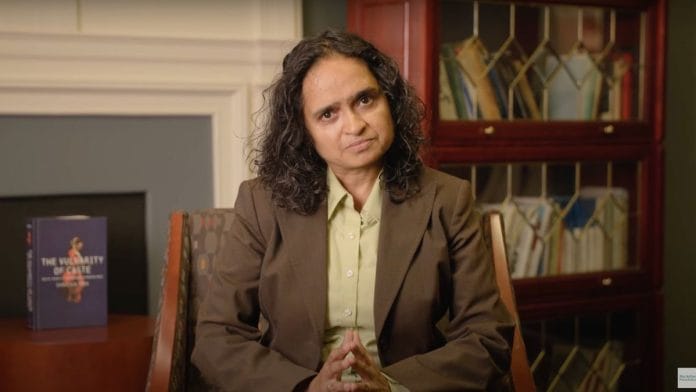New Delhi: US-based historian and author Shailaja Paik has become the first Dalit person to receive the prestigious and much-coveted MacArthur Fellowship of $800,000, often informally called the ‘genius grant’.
“Dalits have given their blood and lives, and I hope non-Dalits will stand with Dalits and fight caste, gender, and racial discrimination in and beyond South Asia,” Paik told ThePrint over email from Cincinnati, US. “It [the fellowship] is a fantastic reminder of the contributions of Dalit Studies, as well as me, a Dalit woman scholar, has made to the different fields of knowledge as well as the global conversation on social justice and human rights.”
The fellowship, awarded to outstanding intellectual and creative talent to expand the scope of their work, will allow Paik “to devote the much-needed time” to research and writing, and to collaborate with colleagues working on caste and social justice “in different parts of the world”.
Born into a poor Dalit family in rural Maharashtra, Paik grew up in a one-room house in a slum area of Pune’s Yerawada. Her father was the first Dalit man from his village to earn a bachelor’s degree. Paik graduated from Savitribai Phule Pune University and completed her PhD at Warwick University, UK, with the help of a Ford Foundation grant. She now teaches history at the University of Cincinnati.
Also read: Unafraid to oppose Ambedkar, Congress—Dakshayani Velayudhan was India’s 1st Dalit woman MLA
Pioneering scholarship
Shailaja Paik’s pioneering scholarship focuses on the intersection of Dalit studies, gender, and sexuality in modern India. Her work has broadened and deepened the study of Dalit feminist thought. Her books explore the everyday lives of generations of Dalit women through ethnographic oral history interviews, and foreground their stories of discrimination and dignity. Her rich research material is excavated from English, Marathi, and Hindi sources. Harvesting the hidden histories of India’s marginalised communities has been a challenge for scholars because research is woefully inadequate in mainstream Indian universities. Because there has been no formal documentation of Dalit historiography for long, she is now working on setting up an archive of her interviews and fieldwork.
“Paik provides new insight into the history of caste domination and traces the ways in which gender and sexuality are used to deny Dalit women dignity and personhood,” says the MacArthur Foundation website.
MacArthur Foundation fellowships are called ‘no-strings attached’ grant that are paid out over five years to creative artists, scholars, and researchers whose work fills critical gaps in the history of knowledge creation. No questions are asked about how they spend the funds, and the fellows are selected through a process of external nominators. Other Indians who have received this fellowship include mathematician Subhash Khot and bioengineer Manu Prakash (2016) as well as environmental engineer Kartik Chandran (2015)—all IIT graduates.
This year, the 22 MacArthur fellows include a sociologist, a trans scholar, a dancer, a poet, a disability activist, a computer scientist, a filmmaker, a violinist, evolutionary biologists, a science educator, a legal scholar, and an oceanographer. Since 1981, the foundation has awarded 1,131 fellowships.
Shailaja Paik’s first book, titled Dalit Women’s Education in Modern India: Double Discrimination, published a decade ago, received critical acclaim among sociologists and educationists. The book centred the experiences of ordinary Dalit women in Maharashtra within Indian historiography regarding struggles to access education in 20th-century India. By emphasising the twin tyrannies of caste and gender in a changing and unchanging India over the last century, Paik expanded the historical scrutiny of education.
Her second book, on the lives of Dalit Tamasha performers, tore into the tensions between the gaze of patriarchal forces and the state. The award-winning book titled The Vulgarity of Caste looked at the cultural stigma surrounding the performances, which are largely regarded as bawdy and sexualised, and the state’s efforts to give it a makeover in public perception. The artists have faced violence and exploitation over time, but the folk performances continue to be a key source of livelihood and autonomy for many Dalit women.
“I contribute to new global histories of our collective humanity, by illuminating the ways Dalit women resist and display resilience and agency—they stand up again and again; they continue to get up and out from the under,” Paik told the MacArthur Fellowship.
She is overwhelmed by receiving the fellowship. “I’ve never been called a “genius” before,” Paik told NPR. “But when I think of how I got here—an often rocky journey—I’m going to embrace it with gratitude.”
(Edited by Prashant)






